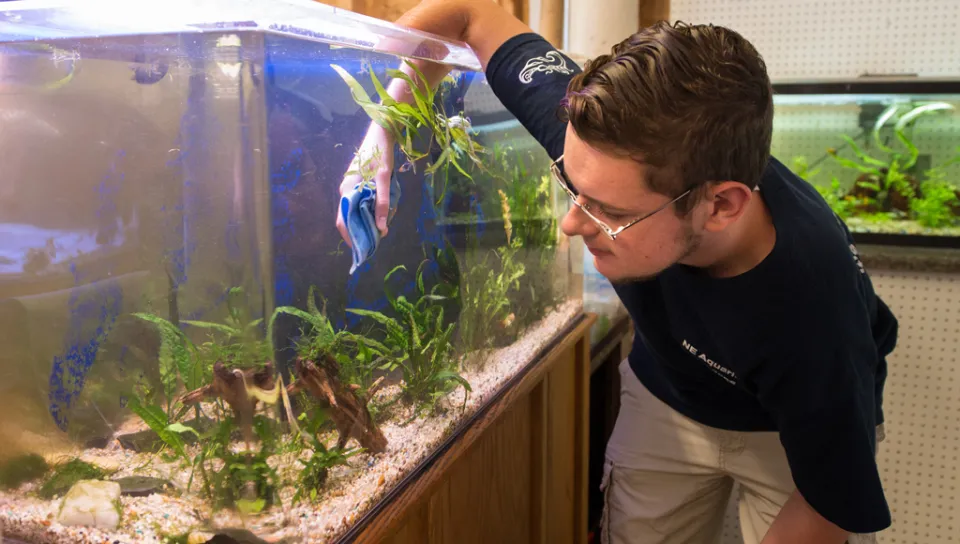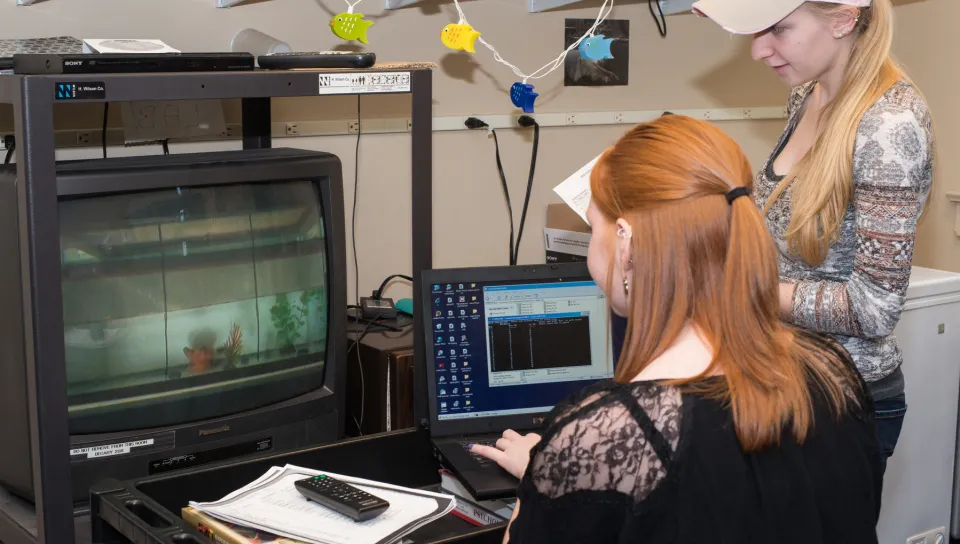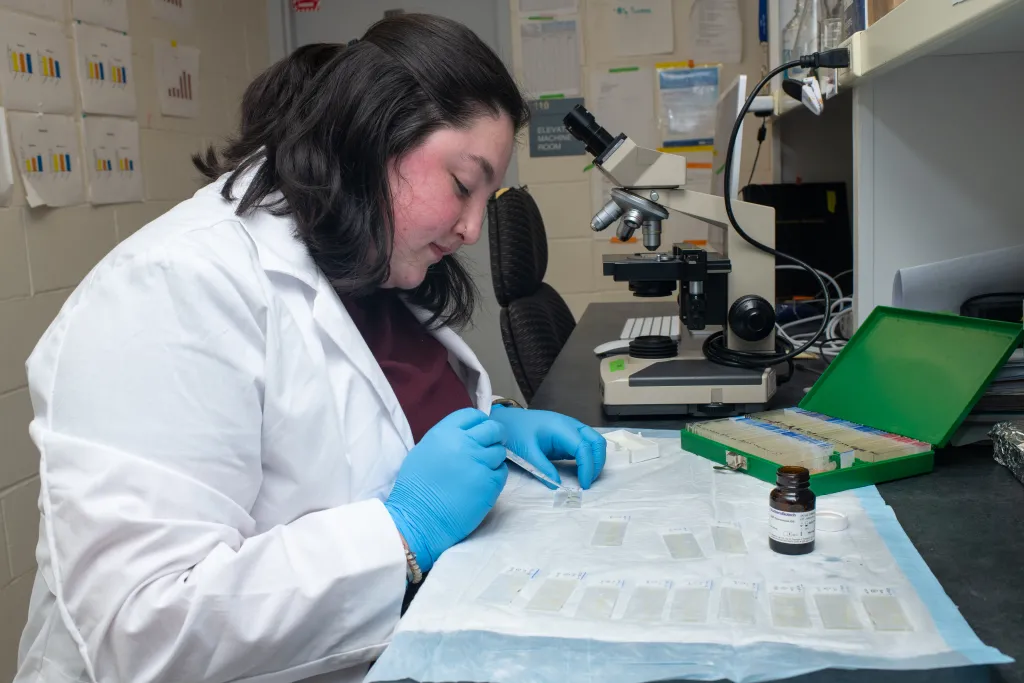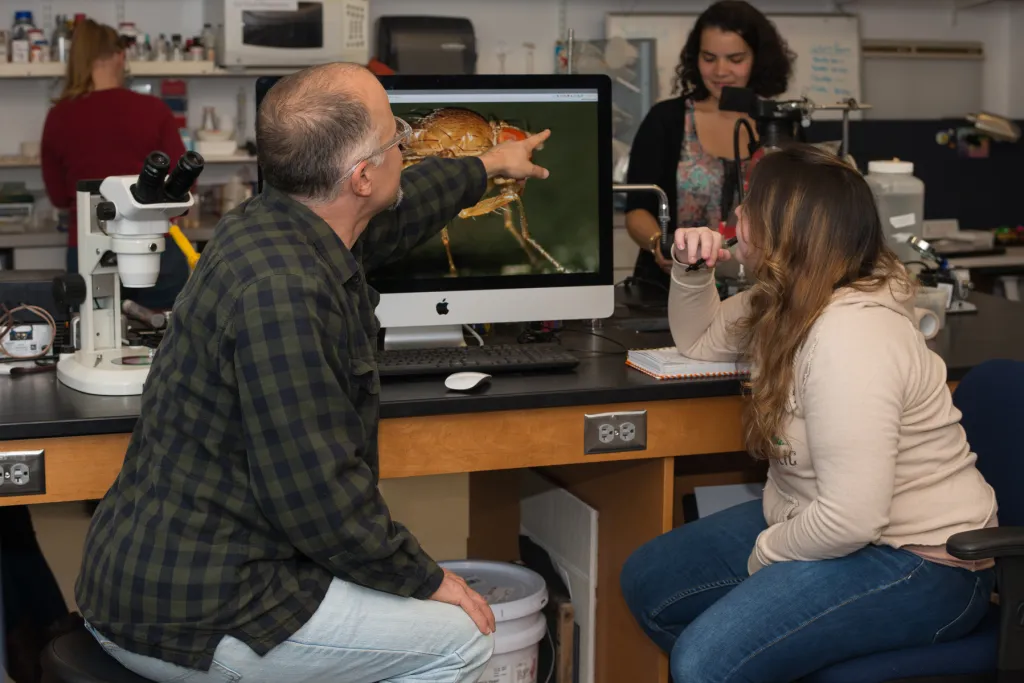Land your dream job and learn how to work with animals
Have you always envisioned yourself working with animals, but you’re not exactly sure how to turn your dream into a profession? The Animal Behavior degree at UNE is truly interdisciplinary, giving you the flexibility to explore many different career paths. At the crossroads of environmental science, biology, marine sciences, neuroscience, and psychology, Animal Behavior encompasses a wide variety of fascinating subjects. Through faculty-mentored research and hands-on internships, Animal Behavior at UNE provides big-school opportunities in a small school setting. Visit our blog to read more about the class experiences, internships, activities, and accomplishments of our Animal Behavior students and faculty.


Why UNE for Animal Behavior
Our program is one of only about a dozen bachelor’s degree-granting programs in Animal Behavior in the country. Take advantage of all its unique offerings:
- Close faculty mentorship and advising
- Elective courses in a wide variety of subjects
- Preparation for diverse career paths
- Hands-on research and internships working with animals
- Curriculum tailored to your specific goals
- Pre-Vet Track
What Will You Study? Animal Behavior Degree Curriculum Overview
Curriculum
| CAS Core Requirements | Credits |
|---|---|
| Total Credits | 42–43 |
| Program Required Courses | Credits |
|---|---|
| BIO 105/105L – Biology I: Ecology/Evolution w/Lab or MAR 105/105L – Eco/Evo of Marine Organisms w/Lab | 4 |
| BIO 106/106L – Biology II: Cellular/Molecular w/Lab or MAR 106/106L – Cell/Molec Bio/Marine Orgs w/Lab | 4 |
| BIO 322 – Comparative Animal Physiology or BIO 245 – General Principles of Anatomy, Physiology & Pathophysiology | 4 |
| CHE 110/110L – General Chemistry I with Lab or CHE 150/150L – University General Chem I w/Lab | 4 |
| CHE 111/111L – General Chemistry II with Lab or CHE 151/151L – University General Chem II w/Lab | 4 |
| MAT 180 – Precalculus | Credits Fulfilled by Core Requirements |
| Organismal topic* | 3–4 |
| PSY 105 – Introduction to Psychology | 3 |
| PSY 225 – Psychology Statistics | 3 |
| PSY 250 – Lifespan Development in Context | Credits Fulfilled by Core Requirements |
| PSY 275 – Intro-Tech in Animal Behavior | 3 |
| PSY 285 – Research Methods | 3 |
| PSY 335 – Comparative Animal Behavior | 3 |
| PSY 362 – Animal Cognition | 3 |
| PSY 365 – Biological Bases of Behavior | 3 |
| PSY 384/384L – Animal Learning and Behavior w/Lab | 4 |
| PSY 425 – Advanced Methods in Animal Behavior | 3 |
| PSY 495 – Animal Behavior Internship/Research | 3–12 |
| Animal Behavior Electives** | 6–13 |
| Total Credits | 60+ |
| Open Elective Courses (as needed to reach 120 credits) | Variable |
| Minimum Total Required Credits | 120 |
|---|
*Organismal topics courses must be 200-level or higher and include a hands-on component. These courses include BIO 222 Finfish/Shellfish Culture Tech; BIO 223 Health Nutrition Feeding of Cultured Organisms; BIO 235 Winter Natural History; BIO257/257L Costa Rica: Tropical Forest and Global Change w/Lab; BIO 305/305L Mammalogy w/Lab; BIO 319 Ornithology; BIO 330 Comp Vert Anatomy; ENV 318 Adv Research Methods Avian Ecol; ENV 356 Terrestrial Wildlife Eco/Cons; MAR 320 Invert Zoology; MAR 331 Biology of Fishes; MAR 355 Biology Marine Mammals; MAR 436/436L Natural History of Iceland w/ Lab; MAR 452/452L Natural History and Evolution of Galapagos Fauna w/Lab; PSY 372 Foraging Behavior; PSY 406 Spec Topics Animal Behavior.
**Three (3) Animal Behavior electives are required if the Animal Behavior internship is 3–4 credits. If the internship is five (5) or more credits, then only two (2) electives are required. Other courses may be applied as electives with the approval of the School of Social and Behavior Sciences director or assistant academic director.
| Elective options | Credits | |
|---|---|---|
| BIO 232 – Microbiology | 3 | |
| BIO 235 – Winter Natural History | 3 | |
| BIO 333 – Evolution | 3 | |
| BIO 345 – General Prin Anat/Phys/Pathophys | 5 | |
| BIO 350 – Ecology | 4 | |
| BIO 422/422L – Coral Biology w/Lab | 4 | |
| BIO 459/459L – Conserv and Ecol Caribbean Isl w/Lab | 4 | |
| ENV 208 – Climate Change | 3 | |
| ENV 250 – Environ Policy Compare Perspect | 3 | |
| ENV 318 – Advanced Methods in Avian Ecology | 4 | |
| ENV 319 – Practicum in Field Ecology Squirrels | 1 | |
| ENV 356 – Terrestrial Wildlife and Ecology | 4 | |
| MAR 250 – Marine Biology | 4 | |
| MAR 252 – Nat His Marine Mammals | 3 | |
| MAR 376 – Bio of Sharks, Skates, Rays | 3 | |
| MAR 428 – Marine Conservation | 3 | |
| MAR 436/436L – Natural History of Iceland w/Lab | 4 | |
| PHY 110/110L – General Physics I w/Lab | 4 | |
| PHY 111/111L – General Physics II w/Lab | 4 | |
| PSY 205 – Abnormal Psychology | 3 | |
| PSY 226 – Motivation & Emotion | 3 | |
| PSY 245 – Evolutionary Psychology | 3 | |
| PSY 278 – Captive Animal Management | 3 | |
| PSY 305 – Special Topics (with program approval) | 3 | |
| PSY 308 – Animal Communication | 3 | |
| PSY 316 – Psychology of Consciousness | 3 | |
| PSY 325 – Psychology of Aging | 3 | |
| PSY 330 – Psychology of Stress | 3 | |
| PSY 364 – Soc & Emot Dev in Childhood | 3 | |
| PSY 370 – Drugs, Society, Behavior | 3 | |
| PSY 371 – Conservation Behavior | 3 | |
| PSY 372 – Foraging Behavior | 3 | |
| PSY 383 – Memory & Cognition | 3 | |
| PSY 406 – Special Topics in Animal Behavior | 3 |
Students in this major can participate in the pre-health graduate school preparation tracks.
To learn more about the program visit the Catalog.
Honors Program
We offer qualified students the option of graduating with Honors. This includes significant research, scholarship, or creative activity under the direction of a faculty member. Interested students should consult with their advisor.
For more information, contact Zach Olson, Ph.D. at (207) 602-2766 or zolson@une.edu
Career Paths for Animal Behavior Majors
Through your coursework, research, and internship experiences, you will be on track to enjoy a successful career in animal behavior.
There are many fascinating professional fields open to Animal Behavior majors, including:
- Veterinary Medicine
- Animal Behavior Research
- Animal Training
- Animal Caregiving in Zoos and Aquariums
- Animal Assisted Therapy
- Wildlife Conservation
- Animal Rehabilitation
Our graduates have landed jobs at prestigious sites, such as:
- Georgia Aquarium
- Mystic Aquarium
- San Diego Zoo
- Columbus Zoo
- NEADS World Class Service Dogs
Career Advising for B.S. in Animal Behavior Students
Whether you have a specific career goal in mind or a vague idea of the field that interests you, Career Advising is here to help you plan your next step.
Explore our Animal Behavior Facilities
As a student in our Animal Behavior program, you benefit from UNE’s extraordinary resources.
Teaching Classrooms
We have dedicated teaching classrooms that allow you the opportunity to work closely with faculty and peers in hands-on activities.
Psychology Labs
In these spaces, you will have the opportunity to work on a variety of projects involving Psychology faculty members. Projects have included memory processes underlying reading comprehension, how explicit and implicit self and relationship processes influence how people navigate the ups and downs of daily life.





Neuroscience Labs
Our faculty members with expertise in the neurosciences have labs dedicated to their research into topics concerning learning and memory, cognition and development, psychopharmacology, and drug addiction and pain.
Animal Behavior Labs
In these labs, you have chances to work with faculty on a variety of research projects, such as ones investigating conservation genetics, wildlife conservation, and how pharmaceuticals, endocrine-disrupting chemicals, and other pollutants affect the behavior of the fish.
Centers for Excellence
These university-wide centers are designed to promote interdisciplinary research and provide opportunities for collaborative research and scholarship programs that are competitive for interdisciplinary, multi-investigator, and multi-institutional awards. The centers also expand student research opportunities, bringing together students, faculty, and partner institutions in pursuit of cooperative goals.
The Center for Excellence in the Neurosciences sponsors research opportunities for Neuroscience majors.
The Center organizes a Neuroscience Summer Scholars Program, supporting Neuroscience majors with their summer research projects.
Summer scholars attend the summer seminar series, which brings in researchers from around the world, and present their experimental results at a research fair held at the conclusion of the summer.
The Center for Excellence in Aging and Health promotes innovative, interprofessional research and programming to extend healthspan, enhance well-being, celebrate personal legacies, and disseminate professional best practices for the benefit of aging adults wherever they call home.
Psychology faculty are active parts of the center and students working with these faculty have the opportunity to explore issues of aging.
Center of Biomedical Research Excellence for the Study of Pain and Sensory Function, dedicated to understanding the neurobiology of pain and the development of novel therapies.


Experiential Learning in the Bachelor’s Degree in Animal Behavior Program
Internships for Animal Behavior Majors
Our graduates have benefitted from a wide array of enriching internships at sites, including
- Center for Wildlife
- Saco River Wildlife Center
- NEADS World Class Service Dogs
- LaDawn Therapeutic Riding Center
- New England Aquarium
- Mystic Aquarium
- Veterinary Clinics and Hospitals
- Smithsonian Institute
- U.S. Fish and Wildlife Service
For more information, contact Zach Olson, Ph.D. at (207) 602-2766 or zolson@une.edu.
watch UNE Students work hands-on with Animals
Research Opportunities for Animal Behavior Majors
As an Animal Behavior major at UNE, you complete at least one research project as part of our Research Methods course, though many choose to become more deeply involved in research in one of our faculty-lead laboratories.
You get the opportunity to fully participate in research including developing new ideas and materials, running participants, and analyzing and disseminating the results of research at conferences, and through publications in peer-reviewed journals.
Several of our faculty members have research laboratories that offer undergraduate research experiences throughout the academic year. Additionally, UNE provides an opportunity for you to apply for research funding through the SURE program to work with a faculty member on research during the summer.
If you are interested in doing research, please contact the faculty to discuss your interests.
Faculty in our Animal Behavior program are currently performing research in the following areas:
- Brian Greco, abnormal behavior, motivation, and welfare
- Zach Olson, Ph.D., behavioral ecology and wildlife conservation
- Margaret Stanton, comparative social behavior, maternal behavior, and offspring development
- Mike Burman, Ph.D., negative emotionality and pain
- Glenn Stevenson, Ph.D., drug development and opioid pharmacology
- Trish Long, Ph.D., interpersonal violence, anxiety,
- Linda Morrison, Ph.D., issues in social, global awareness issues, bystander behavior
- Jennifer Stiegler-Balfour, Ph.D., memory processes underlying reading comprehension
- Julie Peterson, Ph.D., how explicit and implicit self and relationship processes influence daily life
Researching Northern Bog Lemmings
Animal Behavior Clubs and Organizations
As a student in our Animal Behavior program, you have the opportunity to participate in different student organizations specifically geared toward people with a passion similar to your own.
The Animal Behavior Club is open to all members who want to get involved with animals, learn about animals, and get the community pumped about animals.
If you are a UNE student and would like to become a member of the Animal Behavior Club, please emailzolson@une.edu.
Faculty Advisor
The Animal Welfare Judging Team participates in the bi-annual Animal Welfare Judging and Assessment Competition (AWJAC). Through team participation, students learn to apply animal welfare theories and develop skills in public speaking and argumentative logic.
Faculty Advisor
This student organization works with the neuroscience department to promote neuroscience as a major and promotes opportunities for you to know more about the neuroscience field. It also helps connect you with undergrad research opportunities.
If you are a UNE student and would like to become a member of the Psychology Club, contact mrice4@une.edu.
Faculty Advisor

The Pre-vet Club is for anyone who has an interest in animals, including those with hopes of applying to vet school in the future. The club serves those who would like guidance in the vet school application process, as well as those who just want to learn more about animals. We volunteer, get guest speakers, hold workshops, and more.
Faculty Advisor
The mission of the Psychology Club is to create a community of students who share a common interest in the discipline of psychology and its broad application while also providing students with connections to Psychology faculty and opportunities for social engagement.
We welcome Psychology majors and minors as well as anyone else who has an interest in Psychology. We hold regular club meetings and put on campus-wide events that engage members of the larger academic community at UNE in activities that involve psychology.
Past events have included:
- NAMI: Five Stories of Hope and Resiliency
- Relay For Life: We make a team and fundraise annually
- Annual faculty student socials
- Brain Fair
- Out of the Darkness Walk
- Save the Waves
More events are added every year.
How to Join
If you are a UNE student and would like to become a member of the Psychology Club, please contact Kana Colarossi at kcolarossi@une.edu. You are welcome to come to a meeting prior to joining, — you do not have to be a member to attend.
Faculty Advisor
Founded in 1929, PSI CHI is a member of the Association of College Honor Societies and an affiliate of both the American Psychological Association (APA) and the American Psychological Society (APS).
With the stated mission of encouraging, stimulating, and maintaining excellence in scholarship in the science of psychology, PSI CHI has grown to become one of the largest and most successful honor societies in the world with more than 1,100 chapters and 537,000 members. UNE's chapter was formed in 2010.
For more information, visit the official PSI CHI website or contact the UNE chapter's faculty advisor, Dr. Jennifer Stiegler-Balfour at jstiegler@une.edu.
Become a Member
To be eligible for membership in PSI CHI, you must:
- Be a major or minor in UNE's Department of Psychology
- Be at least a second-semester sophomore
- Have completed 9 semester hours of psychology and/or neuroscience courses
- Rank in the top 35 percent of your class in general scholarship
- Possess a minimum GPA of 3.0 (on a 4.0 scale) in both psychology and neuroscience classes and cumulatively
- Maintain a high standard of personal behavior
Resources
Announcements
APAGS/Psi Chi Junior Scientist Fellowship
The intent of the Junior Scientist Fellowship is two-fold: to provide funding for a first-year or second-year graduate-level project and to provide constructive feedback to select applicants to increase their chances of achieving success on future National Science Foundation (NSF) Graduate Research Fellowship applications.
The primary intent is to recognize outstanding research-oriented students who are entering their first year (or the first semester of their second year) of graduate study and to help them get their research off the ground. Graduate students from research-based psychology and neuroscience programs are eligible to apply.
The second intent of this fellowship is to provide written feedback to select applicants. Many students apply for the NSF Graduate Research Fellowship without ever having applied for a research fellowship. By providing feedback to select applicants, this program encourages them to strengthen their NSF graduate fellowship applications.
Funds for this $1,000 fellowship must be used to support direct research costs. These funds can be used to pay participants, purchase essential equipment or software, acquire books or instructional manuals critical to one's line of research, pay fees to publish in open-access journals, or for any other direct research cost. The funds cannot be used for indirect costs such as travel, personal computers, or class textbooks. The funds can be used for any direct research costs in a student's first year (or in the second year, if submitting in the summer prior to one's second year) of graduate school and do not need to be limited to the research discussed in the Research Essay.
Special APS Membership Offer for PSI CHI Student Members
The Association for Psychological Science is offering a reduced APS Students Membership rate for PSI CHI student members. Membership includes subscriptions to four APS journals, discount rates for the APS annual convention, and other benefits. This offer is good for new memberships only. To take advantage of this offer, use the PSI CHI promotional code PSCH at www.psychologicalscience.org/join.
Apply Today
Ready to begin your future in UNE’s Bachelor of Science in Animal Behavior? Get started today.

Bachelor of Science in Animal Behavior FAQ
What is an animal behavior degree?
An animal behavior degree equips students with the skills to comprehend why animals behave the way they do. Graduates with an animal behavior degree can pursue diverse careers, including roles like wildlife biologist, researcher, zookeeper, animal trainer, wildlife rehabilitator, or laboratory manager. It can also be a starting point for further education like a master's or doctoral degree or a professional program such as veterinary sciences. Many of our student who are interested in going to veterinary studies participate in our pre-veterinary track.
UNE offers a Bachelor of Science (B.S.) degree in Animal Behavior. Our program in Maine is one of only about a dozen bachelor’s degree-granting programs in Animal Behavior in the country. Unique offerings include close faculty mentorship and advising, elective courses in a wide variety of subjects, preparation for diverse career paths, hands-on research and internships working with animals, a curriculum tailored to your specific goals, and a pre-vet Track. Additionally, UNE offers a Minor in Animal Behavior.
Is animal behavior a good major if I want to go to vet school?
Yes, earning an animal behavior degree is a great starting point if you want to eventually go to vet school. At UNE, Animal Behavior students interested in veterinary studies can participate in our pre-veterinary track.
Several pre-vet students at UNE have participated in experiential learning and internship opportunities at local veterinary clinics and hospitals.
Is animal behavior an accredited college degree?
Yes. UNE’s B.S. in Animal Behavior is accredited by the New England Commission of Higher Education. UNE's School of Social and Behavioral Sciences offers 8 majors and 11 minors each of which is accredited.
What can you do with an animal behavior degree?
There are many fascinating professional fields open to animal behavior majors, including veterinary medicine, animal behavior research, animal training, animal caregiving in zoos and aquariums, animal-assisted therapy, wildlife conservation, and animal rehabilitation.
UNE students who have graduated with our Animal Behavior degree have landed jobs at prestigious sites, such as the Georgia Aquarium, Mystic Aquarium, San Diego Zoo, Columbus Zoo, NEADS World Class Service Dogs, and have gained entrance to a number of vet schools and other graduate programs. Whether you have a specific career goal in mind or a vague idea of the field that interests you, UNE’s Academic and Career Advising Center is here to help you plan your next step.
How much money do animal behavior majors make?
Many entry-level job salaries for students receiving an animal behavior degree range between $40,000 - $60,000. Some related animal behavior jobs and their average respective salaries include:
- Veterinarian: $109,524 *
- Veterinarian Medicine Scientist: $80,940
- Veterinarian Assistant: $54,915
- Zoologist: $54,222
- Wildlife Biologist: $51,084
- Research Assistant: $42,896
How do you get a degree in animal behavior?
If you have always envisioned yourself working with animals, but are unsure how to turn your dream into a profession, consider getting a degree in animal behavior. A bachelor’s degree typically takes up to four years of full-time study.
In order to get a degree in animal behavior at UNE, students must complete a minimum of 120 credit hours. This includes:
- 42–46 credits of College of Arts and Sciences (CAS) core curriculum
- 6–13 credits of animal behavior electives
- 60 Program-Specific Credits
- Variable electives to reach 120 credits
Is an animal behavior degree the same as a psychology degree?
At the crossroads of environmental science, biology, marine sciences, neuroscience, and psychology, an animal behavior degree encompasses a wide variety of fascinating subjects.
The interdisciplinary curriculum at UNE is designed to build concept and skill mastery in the discipline of animal behavior and includes coursework in the fields of psychology (the study of behavior and mental processes) and biology (the study of the living world; including marine and environmental sciences), among other disciplines.
UNE also offers a Bachelor of Arts (B.A.) in Psychology as a major and a Minor in Psychology.
Is an animal behavior degree the same as an animal science degree?
No, animal science and animal behavior are not the same. Because they are both animal-related degree programs, an animal behavior degree is often confused with an animal science degree. Animal science majors typically engage in a curriculum that primarily emphasizes the management of livestock species like cattle, horses, pigs, goats, and sheep, with some programs also including the study of companion animal species to some extent. Depending on the program, coursework may include topics in animal behavior.
Very few schools offer an animal behavior degree program at the undergraduate level. UNE in Maine is one of those programs. Our Bachelor of Science (B.S.) degree in Animal Behavior is truly interdisciplinary incorporating coursework in environmental science, biology, marine sciences, neuroscience, psychology, with animal behavior. This gives students the flexibility to explore many different career paths including animal rehabilitation, animal behavior research, animal training, and veterinary medicine.
What colleges offer the best animal behavior degrees for me?
If you’ve always been fascinated by how and why animals behave the way they do, consider majoring in animal behavior. Keep the following factors in mind when choosing which college or university offers the best animal behavior degree program for you.
Faculty
Identify the animal behavior faculty whose expertise matches your interests, whether it's in areas like ethology, behavioral ecology, animal cognition, or related fields. Check if their research aligns with your own interests.
Animal Behavior students at UNE receive mentorship from nationally and internationally known faculty at UNE. Several of our faculty members have research laboratories that offer undergraduate research experiences throughout the academic year. Additionally, UNE provides an opportunity for you to apply for research funding through the Summer Undergraduate Research Experience (SURE) program to work with a faculty member on research during the summer. Through faculty-mentored research and hands-on internships, Animal Behavior at UNE provides big-school opportunities in a small school setting in New England.
Curriculum
Review the animal behavior program to align with your interests, exploring areas such as animal cognition, ethology, behavioral ecology, or related fields, as well as the availability of research and internship opportunities in animal behavior.
UNE’s Animal Behavior curriculum is tailored to students’ specific goals. The program fulfills its mission through a comprehensive interdisciplinary curriculum, an emphasis on preparing students for careers and internships and providing challenging opportunities for undergraduate research inside and outside the classroom.
This curriculum is specifically designed to help students master concepts and skills in animal behavior, incorporating courses in psychology (the study of behavior and mental processes) and biology (the study of living organisms, including marine and environmental sciences), among other subjects.
The following are just some examples of the exciting courses that the Animal Behavior degree offers:
- Animal Cognition
- Captive Animal Management
- Animal Communication
- Comparative Animal Behavior
- Animal Cultures
- Conservation Behavior
Learn more about UNE’s Animal Behavior curriculum
Career goals
Choose an animal behavior degree program that aligns with your career aspirations and goals. Explore the available resources to help you plan your path forward.
An animal behavior major can lead to employment in national parks, research laboratories, veterinary clinics, canine rehabilitation facilities, animal shelters, aquariums or zoos, or academia. UNE’s Animal Behavior program realizes its mission through a rigorous interdisciplinary curriculum, a focus on career readiness and internship experiences, and by challenging students with opportunities for undergraduate research both in and out of the classroom.
Graduates of UNE’s Animal Behavior degree program in Maine have benefitted from a wide array of enriching internships at sites including the Center for Wildlife, Saco River Wildlife Center, NEADS World Class Service Dogs, LaDawn Therapeutic Riding Center, New England Aquarium, Mystic Aquarium, Veterinary Clinics and Hospitals, Smithsonian Institute, and U.S. Fish and Wildlife Service. Many of our graduates also go on to pursue graduate studies in biology, conservation, ecology, natural resources management, psychology, marine biology and more. Our program prepares students for both careers right out of college and/ or graduate studies.
UNE students have the ability to work with our Academic and Career Advising Center. It doesn’t matter if you have a clear career goal or just a general interest in a field.
Learn more about Career Advising at UNE
Location and environment
Think about the location and surroundings that will enhance your journey as an animal behavior major. UNE is Maine’s largest private university. We have three unique campuses that provide diverse learning opportunities. In Maine, two campuses in Biddeford and Portland offer renowned undergraduate, graduate, and professional programs. Our Tangier, Morocco campus also hosts a unique semester abroad program for UNE students.
Learn more about UNE’s campuses and how you can visit us
Students in our Animal Behavior program benefit from UNE's extraordinary resources:
- Teaching classrooms - special spaces where you can learn hands-on with faculty and peers.
- Psychology labs - places where you work with Psychology faculty on different projects. Some projects explore memory and reading, while others look at how our thoughts affect daily life.
- Neuroscience labs - skilled faculty study topics concerning learning and memory, cognition and development, psychopharmacology, and drug addiction and pain.
- Animal behavior labs - labs where you can team up with faculty conducting research. This could involve studying genetics, wildlife, or social behavior.
- Centers for Excellence – there are three relevant centers for Animal Behavior majors at UNE:
- Center For Excellence In Neuroscience
- Center For Excellence In Aging And Health
- Center Of Biomedical Research Excellence For The Study Of Pain And Sensory Function
As a UNE Animal Behavior student, you will have the opportunity to participate in different student organizations specifically geared toward people with a passion similar to your own:
- Animal Behavior Club - open to all members who want to get involved with animals, learn about animals, and get the community pumped about animals.
- Neuroscience Club - collaborates with the neuroscience department to encourage the neuroscience major and helps you explore the field. Also, it connects you to chances for research as an undergrad.
- Psychology Club - welcomes Psychology students and anyone interested in Psychology. Holds regular club meetings and campus events to involve the UNE community in psychology-related activities.
- Psi Chi - the International Honor Society in Psychology, open to majors and minors in Psychology, Mental Health and Rehabilitation, Art Therapy, Animal Behavior and Neuroscience, Psychology, Neuroscience, or Animal Behavior.
Financial aid
Consider whether the school you're interested in provides financial aid or scholarships to support your education.
A UNE undergraduate education is very affordable. Our tuition is 16% below the average tuition for private universities in New England. Plus, all incoming full-time undergraduate students at UNE will receive Merit Scholarships in amounts from $5,000 to $22,000 per year.
Learn more about grants and scholarships available to students at UNE




